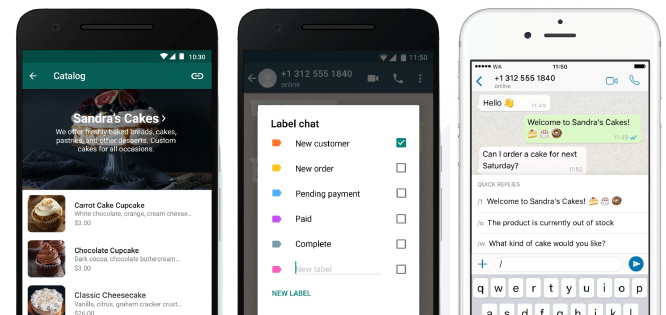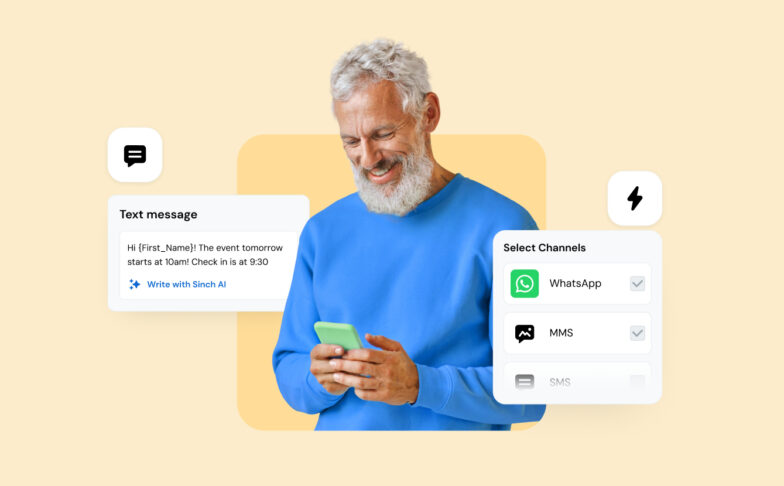Conversations
Thinking about using the WhatsApp Business App? Here’s a better solution!

When looking for business solutions for WhatsApp, the first choice is often the WhatsApp Business App. But there’s a better (and safer!) solution!
When it comes to instant messaging, WhatsApp is THE messaging app. As of 2025, Meta’s green messenger app is the most popular messaging app in the world and counts two billion monthly active users (and even three million, according to some sources). In countries like India or Brazil almost everybody who uses a smartphone also uses WhatsApp. Even U.S. users are starting to warm up to WhatsApp. It’s therefore only natural for companies to want to reach out to their customers on their favorite platform.
When looking for a WhatsApp business solution, the free WhatsApp Business app often is the first choice, but there are many limitation. And, what some might not even know: There’s an even better solution, the WhatsApp Business API!
WhatsApp Business app vs. API: What are the differences?
We all know the “WhatsApp app” from our private communication. However, WhatsApp prohibits the commercial use of the private WhatsApp version. Instead, WhatsApp offers two business solutions for companies: the WhatsApp Business app and the WhatsApp Business API (since 2022, the API is officially called WhatsApp Business Platform).
Not 100% sure how the standard WhatsApp and WhatsApp Business are different? Check out our guide to learn all the ins and outs.
Let’s explore the differences between the two WhatsApp business solutions.
WhatsApp Business app
This version is most suitable for small businesses with up to five employees. It’s free of charge, but doesn’t offer scalable options for marketing and sales, it’s limited to one phone, you can’t use chatbots, and it doesn’t guarantee data privacy. If you’ve tried to use this app to send out bulk messages and promotions, you might have already faced the issue that you can only reach up to 50 unique users per broadcast list. If you surpass that limit, WhatsApp actually blocks your number!
In some regions, you can upgrade to Meta Verified to increase your message limit to about 250 contacts, but that’s still a far cry from the unlimited messages and additional features you get through the API.
WhatsApp Business API
This version is accessible through WhatsApp Business Solution Providers (official Meta partners) like Sinch. With Sinch, you can either access the API through our established WhatsApp platform or work with our API to build your own solution, depending on your needs. In either case, you’ll be able to scale your WhatsApp messaging, work with integrations (chatbots, CRM, contact centers, and more), and data compliance is 100% guaranteed.
The following table shows you a direct feature comparison between the WhatsApp Business app and the WhatsApp API.
| WhatsApp Features | WhatsApp Business app | WhatsApp API |
| Free of charge | ✓ (only the basic version w/o Meta Verified) | X |
| Business use permitted | ✓ | ✓ |
| Business profile and catalog | ✓ | ✓ |
| Unlimited number of agents | X | ✓ |
| Message templates (marketing, utility, authentication, OTPs) | X | ✓ |
| Scheduling templated messages | X | ✓ |
| CTA buttons | X | ✓ |
| Variables for personalized messages | X | ✓ |
| Integrations (CRMs, other channels, etc.) | X | ✓ |
| Chatbots | X | ✓ |
| WhatsApp Flows | X | ✓ |
| Verification (blue check mark) | X (possible with Meta Verified subscription) | ✓ |
| Display name (instead of phone number) | X | ✓ |
| Fully data-compliant | X | ✓ |
Benefits: What does the WhatsApp Business app offer?
The WhatsApp Business app is a free solution that was specifically designed for small businesses. It works very similar to the regular app, and makes communication between companies and businesses on WhatsApp very easy.
The WhatsApp Business app runs on smartphones and allows you to set up a company profile. You’ll be able to set up the following features:
- product catalog
- labels
- quick replies
- welcome messages
- away messages
- broadcasts (with a maximum of 50 unique users per list)

For some businesses, these options might be all they need. Small companies with no more than five employees or freelancers who are not too worried about scaling marketing and sales, are probably fine with this version. However, there are also some disadvantages and limitations.
Downsides: 5 reasons why the WhatsApp Business app isn’t suitable for most companies
1. You can’t push sales or send promotional messages
After a long hiatus, WhatsApp brought back marketing messages for companies in June of 2021. However, on the WhatsApp Business app, the push messages now come with several limitations. First, users of WhatsApp Business could send broadcasts to 256 unique users per broadcast list. Fast forward to 2025, and this number has been dwindled down to 50 (unless you pay for Meta Verified).
And what some WhatsApp Business app users might not now: You can only send these business-initiated messages to WhatsApp users that already have your business number saved in their contacts.
All of this makes it very hard to run marketing campaigns or scale your approach.
And: You also can’t use templates or automations! These are only available on the API. This means that you manually have to set up a new message every time you want to send promotional messages.
The same goes for back-in-stock updates, personalized recommendations, or promoting new products and events. In other words: If you just use the WhatsApp Business app, you can’t really get the most out of marketing campaigns or push sales.
The use cases for WhatsApp Business are therefore very limited, which is why, a lot of companies make the switch to the WhatsApp Business Platform (API) where they can take advantage of the full range of possibilities of the WhatsApp business communication.
2. It becomes a real hassle for companies with more than five employees
Customer communication is usually not the responsibility of just one person in the company. With the WhatsApp Business App, however, only one employee can answer incoming inquiries on a smartphone and the free version app only supports a maximum of five users (with Meta Verified, you get up to ten).
This becomes a real hassle when the “WhatsApp phone” employee works from home, is out of office, on vacation, or sick. With data not coming together in one place, it’s a real chore to make sure no information is lost and customers get speedy answers. And if your business has several branches, it becomes a nightmare having to give customers different WhatsApp numbers for different locations.
For creative agency I love DESIGN, this was one of the main reasons to switch to the API.
We started with the WhatsApp Business app and every employee had the u0022WhatsApp phoneu0022 once every day. At a certain point, we were getting so many queries that system didn’t work anymore and we needed a scalable solution.

3. It’s not possible to integrate existing CRM systems
Even small and medium-sized companies want to offer their customers smooth and quick, target-oriented communication. This includes always knowing what the last point of conversation was, and what information was exchanged.
This is not only important for conversations on messaging apps, but also for e-mails or phone calls. Typically, almost any company nowadays has a CRM system to keep track of this. However, the WhatsApp Business app doesn’t enable an interface here, so customer communication remains completely isolated on the smartphone, and you would have to transfer information from chats manually into your CRM system – fun (not)!
4. You’ll have limited automation options
Using the potential of WhatsApp chatbots and simple automation on WhatsApp is not even remotely possible with the WhatsApp Business app. Today, WhatsApp chatbots can be set up very easily and without programming knowledge and answer up to 80 percent of frequently asked questions in an automated way.
This is not only an advantage for large companies that want to scale their customer service, but also for small businesses with more limited resources, as they can save time, money, and allocate their employee’s time more productively.
The WhatsApp chatbot complements our service in terms of being available 24/7 and offering modern communication.

5. Data compliance isn’t guaranteed
Like the private WhatsApp app, the WhatsApp Business App accesses and processes data in your saved contacts. In addition, chats run via U.S. servers and meta data is exchanged, all of which is problematic according to data regulations, such as the IT act in India, the GDPR in the European Union, the Data Protection Act in the UK, and several consumer privacy acts in the United States.
Numerous companies start with the WhatsApp Business app, but then quickly reach their limits when using it, due to concerns over data privacy. It’s what made WEICON, a German company that specializes in adhesion solutions switch to the API.
In order to use WhatsApp in our team and assure data protection, switching to the WhatsApp Business API was the logical step for us.
How to get access to the WhatsApp Business API
There are definitely some benefits to the WhatsApp Business app. It’s convenient to download, and it’s free. However, if you really want to grow your business, analyze customer data (and protect it), and measure KPIs, you’ll need to upgrade to the WhatsApp Business API.
How does that work?
There are basically four ways to get access to the WhatsApp Business Platform.
- Direct access through Meta (good luck!)
- Using the Meta Cloud (IT skills required, data protection not guaranteed, unless you set up your own servers, which is costly)
- An interface from a certified WhatsApp Business Solution provider like Sinch (not very expensive, IT skills needed, 100% compliant with data privacy laws)
- Using a software solution also provided by a WhatsApp Business Solution Provider such as Sinch
WhatsApp Business Solution Providers (BSPs) are official WhatsApp partners that are authorized to offer businesses access to the WhatsApp Business API. Sinch is a BSPs with years of experience, and more than 150,000 businesses worldwide use our digital communication solutions. With our WhatsApp solution, you’ll have a safe and compliant WhatsApp platform where you can
- Easily scale your messages
- Integrate external platforms (contact centers, CRMs, etc.)
- Add chatbots (with or without AI)
- Go omnichannel (think: Telegram, Instagram Direct Messages, Apple Messages for Business, RCS, and more… all managed from the same place)
- Count on our team to support you every step of the way
Three companies that switched to the WhatsApp API
Is it hard to go from one WhatsApp business version to the other? Not at all! The following companies have made the switch from the WhatsApp Business App to the API with Sinch, and never looked back.
1. The online paint retailer MissPompadour: “We were online in two weeks.”
MissPompadour is an online retailer specializing in DIY paints. Being an online business, they were already an avid user of social media platforms like Instagram to promote their business. WhatsApp was the next logical step to offer their clients a convenient and direct way to communicate with them.
Soon, however, the customer requests were no longer manageable with a private WhatsApp number on the cell phone. And since the WhatsApp business app could not meet the requirements of a professional company either, MissPompadour swiftly and easily moved to Sinch.
With Sinch, we were online in two weeks. We should have made the switch earlier, this would have saved us a lot of trouble.

The result? They managed to turn their WhatsApp channel into a sales machine where nine out of ten chats convert into a purchase!
2. The affiliate platform for influencers stylink: Scaling their business globally
Stylink is a platform that connects influencers and affiliate partners, and helps influencers generate affiliate links on their social media platforms or blogs. And even though most influencers place their affiliate links on Instagram, when they have a question about the affiliate links, they reach out to stylink on WhatsApp.
As stylink gets a lot of requests and needs to be able to answer immediately, and send automated links, the company was looking for a scalable solution with a suitable interface to their CRM system, chatbot options, and WhatsApp notifications. And they found Sinch!
The result? Stylink has been able to grow their business through WhatsApp, and has now expanded to new international markets. The profesional messaging solution also helped them in this process, as it was very easy to integrate new mesaging apps. For example, in the U.S., stylink now uses iMessage successfully.
3. The marketing agency I love DESIGN
Like many businesses, the marketing agency I love DESIGN started talking to their customers on the WhatsApp Business App. Soon, the expected benefits didn’t pan out. They had to pass on their “WhatsApp phone” to a different employee every day, which became unmanageable.
That’s when they decided to switch to the WhatsApp Business API with Sinch. The result? They were able to make their customer service more efficient, and 70% of their customers now contact them on WhatsApp.
Ready to make the switch?
For very small businesses that aren’t concerned with data compliance, WhatsApp Business app might be a viable solution. However, most companies will need a safe and scalable solution, which leads them to the WhatsApp API.
Don’t worry if you started with the free app and want to make the switch now. With a reliable WhatsApp partner, it’s very easy to upgrade to the API. Reach out to our team to talk through the process.
What are you waiting for?
Get started with WhatsApp!



